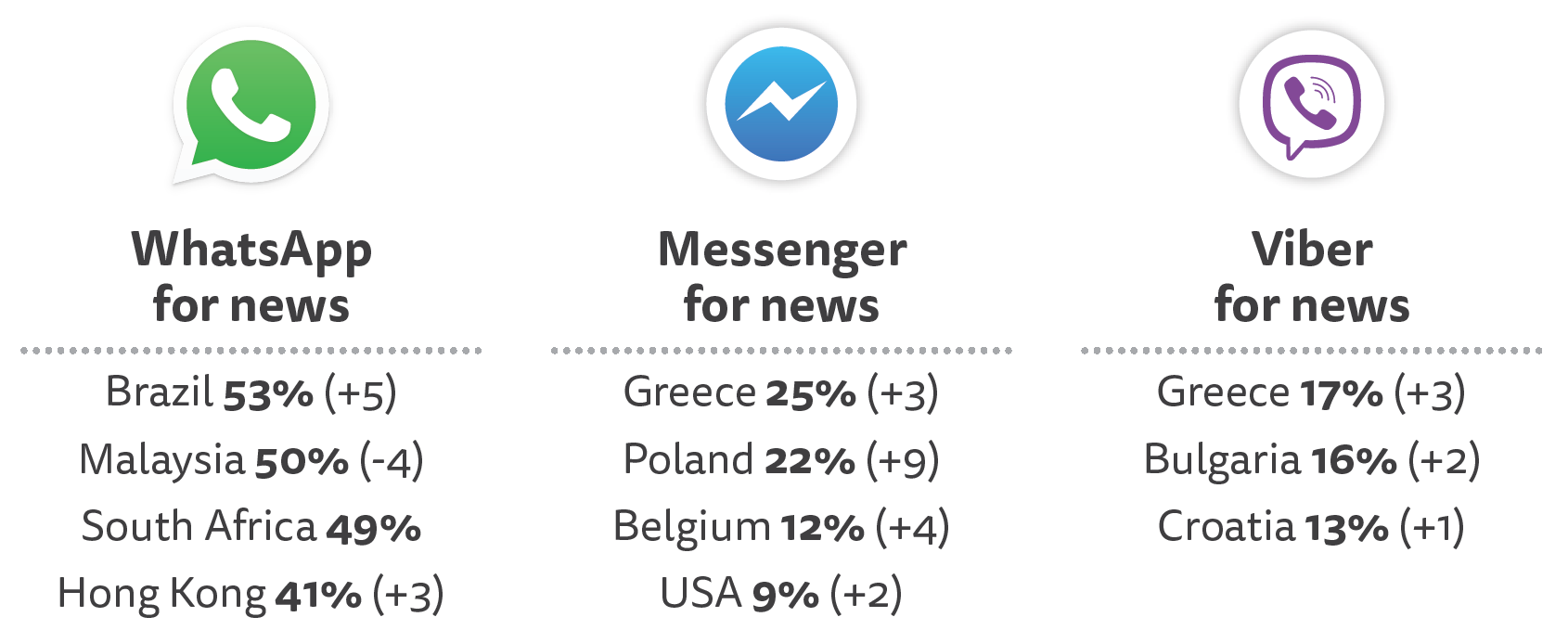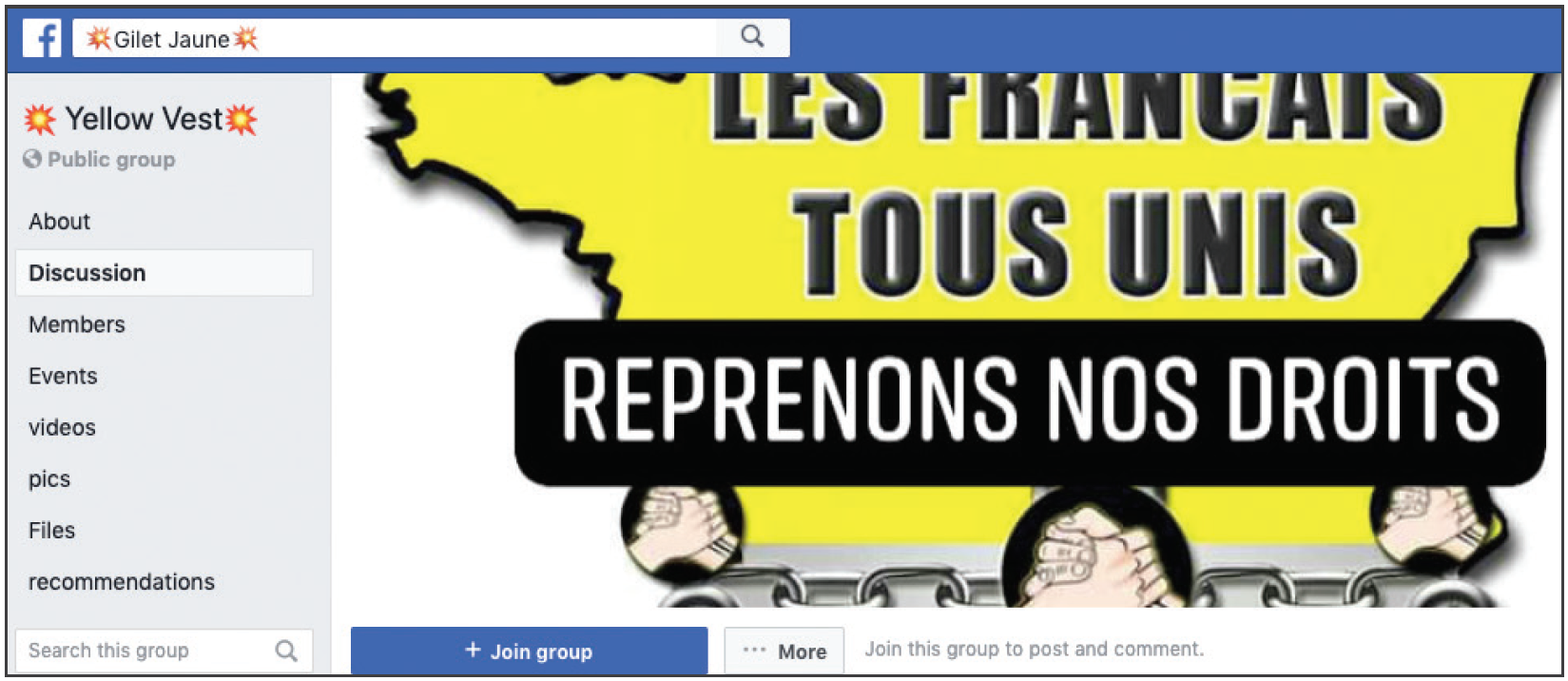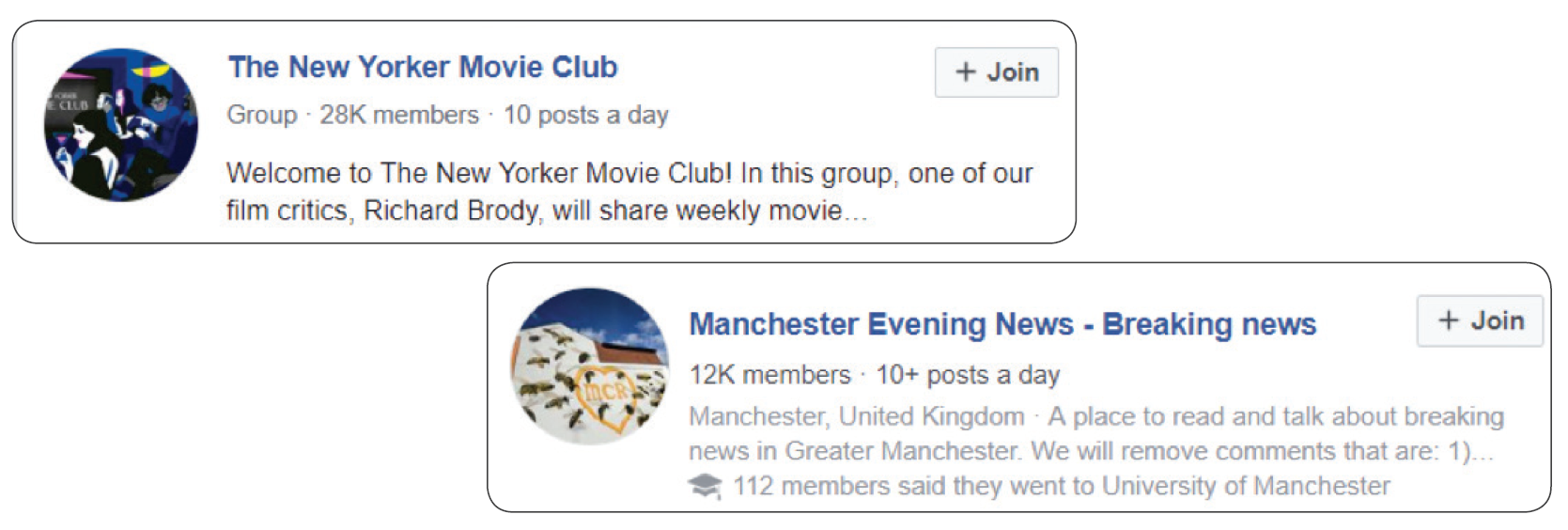The number of people accessing news via social media is now relatively stable in most countries. However, the relationship between news and social media continues to evolve. Facebook has stated that private messaging, ephemeral stories, and small groups are now among the fastest growing areas of online communication, and has refocused its strategy on privacy and encryption. Our own research shows that people are spending less time with relatively open networks like Facebook and more time with more private messaging applications like WhatsApp, Facebook Messenger, Viber, and Telegram. They are also using them more heavily for news. In this section, we explore this shift towards private spaces for news consumption and discussion, and the implications this has for publishers and for society.
PROPORTION THAT USED EACH MESSAGING APPLICATION FOR NEWS IN THE LAST WEEK
Selected markets
Base: Total sample in each market ≈ 2000.
Context Collapse
Facebook CEO Mark Zuckerberg acknowledges that not everyone wants to reveal their secrets in the ‘digital equivalent of the town square’. Across its networks Facebook is building features that facilitate more intimate conversations in smaller, private groups.1 Within Facebook itself, group discussions have been prioritised within the newsfeed, and the discovery of new groups has been improved.
These changes will likely alter the nature of political discussion online. Some academic research has found that political talk on private messaging apps has beneficial outcomes, such as increasing political participation (Vaccari and Valeriani 2018). Yet at the same time, investigations in India and Brazil have linked WhatsApp groups to the spread of political propaganda, misinformation, and hate speech.2 Others worry that the use of private groups might create echo chambers that reinforce existing views and further polarisation in society. In the light of these concerns we were keen to understand more about how Facebook and WhatsApp groups are being used – and more about the people who access them regularly.
The Extent of Groups in WhatsApp and Facebook
Looking at nine countries with different levels of social media activity – US, UK, Spain, Ireland, Turkey, Malaysia, Australia, Canada, and Brazil – we find that the majority of Facebook and WhatsApp users are members of one or more active groups. Two-thirds (63%) of Facebook users, and three-quarters (76%) of WhatsApp users, say they used a group during the month leading up in the survey.
About half of Facebook users (49%) and around three-quarters (72%) of WhatsApp users in these countries said they are part of groups with people they know well, such as friends, colleagues, and family. About half of Facebook and WhatsApp users (51% and 46% respectively) are active members of groups that mostly include people they do not know.
WhatsApp groups, as one might expect, are more focused on private conversation with friends, family, and work colleagues. By contrast, Facebook Groups tend to be more about sharing experiences with people we know less well. Having said that, it is clear that WhatsApp is used very differently across countries with two basic models. The majority of WhatsApp users in Turkey (65%), Spain (40%), Malaysia (60%), and Brazil (58%) use groups to interact with people they don’t know. By contrast, only a minority of users in Australia (27%) and the UK (12%) seem prepared to use WhatsApp in this way. Countries like Brazil, with their bigger groups, seem to have been more prone to the spread of political misinformation and disinformation via WhatsApp.3
The Role of News in Groups
The vast majority of Facebook or WhatsApp groups do not cover news or politics. In both networks, our data indicate that the most popular groups tend to be set up to discuss shared hobbies or passions (22% of Facebook users and 17% of WhatsApp users), followed by local community groups (18% of Facebook users and 15% of WhatsApp users).
Other popular groups cover topics like health, education, and parenting. Groups set up to discuss news or politics are used only by a small proportion of users of these platforms in the UK and Spain (8% of Facebook and 2% of WhatsApp users) – but these numbers do rise considerably in Turkey and Brazil.
News Group Users Tend to be More Partisan
What are the demographic characteristics of those that join groups? In the end, people have to make a conscious decision to become a member of a group, and this is reflected in their user profile. Those that join Facebook or WhatsApp groups tend to be better educated and more politically committed, coming from the far-right or the far-left rather than from the political centre.
Other characteristics are more even. Men are slightly more likely to join a news group, with 16% of male Facebook users part of news or political groups, compared to 12% of female users, and the same is broadly true of WhatsApp.
A key characteristic that distinguishes news group users from the wider population in each country is that they are more likely to say they trust the news they get from social media. In the UK, around half of either WhatsApp or Facebook news groups trust news from social (46%) compared with just 10% of the whole sample. We also find large differences between the national average and the users of groups related to news or politics in Brazil, Malaysia, and Spain. This suggests that, for the minority that use them, the news that these groups serve up is an important part of their overall news diet.
News group users also tend to have news diets that are quite distinctive. They are significantly more likely to use an alternative or partisan news source than those who do not use groups for news. In the UK almost a third (30%) of those participating in news groups within Facebook or WhatsApp use alternative or partisan brands, compared with just 7% for the overall sample.
Even in Brazil, where there is higher use of alternative and partisan news brands (42% on a weekly basis), we can see that their reach is higher among members of Facebook and WhatsApp news groups (65%). However, it is also clear that news group users also rely on more mainstream outlets too. On average they use 7.1 online news sources in a typical weak – around double the average number used by the whole sample across these nine countries (3.6).
Opportunities for Publishers
As groups have become more relevant, journalists have started to use them for sourcing and distributing stories. In authoritarian countries – where the traditional news media are often tightly controlled – journalists have used private groups in messaging apps to spread news about protests to key influencers.4 Condé Nast has invested in private Facebook groups for many of its publications – including the New Yorker Movie Club, where some 28,000 members discuss films with the magazine’s critics.
Local Facebook groups have been another new way to share and discuss content and to build community. Reach plc, which owns hundreds of local newspapers in the UK, curates many such discussion pages, including one around breaking news in Manchester that has 12,000 members.
Spaceship Media is a company in the US that moderates a number of ‘secret’ Facebook groups where strangers are invited to share thoughts and experiences about current affairs and broader topics – engaging in what they call ‘dialogue journalism’.5
Overall, we find that most active users of groups on Facebook and WhatsApp are not members of groups set up to discuss politics or news. Those who do are more likely to be male, highly educated, and partisan. They are also more likely to trust news they get from social media, and more likely to use many different news sources – including those that are alternative or partisan.
While these news diets may not be directly linked to their participation in groups, it is possible that regular interaction with like-minded people could play a role in reinforcing strongly held views. Lastly it should be noted that our analysis is focused on active users of groups set up to discuss politics or news. However, discussion around news and politics also happens regularly in groups about health, parenting, or local communities.
- https://www.facebook.com/notes/mark-zuckerberg/a-privacy-focused-vision-for-social-networking/10156700570096634/ ↩
- https://uk.reuters.com/article/uk-brazil-election-whatsapp-explainer/facebooks-whatsapp-flooded-with-fake-news-in-brazil-election-idUKKCN1MU0UZ ↩
- https://www.theguardian.com/world/2018/oct/25/brazil-president-jair-bolsonaro-whatsapp-fake-news ↩
- https://www.cjr.org/tow_center_reports/foreign_correspondents_chat_apps_unrest.php ↩
- https://medium.com/@markfrankel29/journalists-have-an-open-invitation-to-an-interesting-and-under-used-beat-5c3d739e16ae ↩



